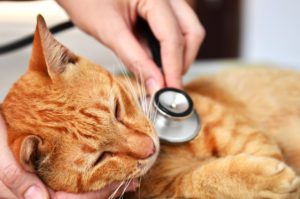 As a cat owner, you probably already know how dangerous feline leukemia (or FeLV) is for your cat. However, you might not be fully aware of everything involved in this diagnosis, and you might be worried about whether or not your cat could have it, too.
As a cat owner, you probably already know how dangerous feline leukemia (or FeLV) is for your cat. However, you might not be fully aware of everything involved in this diagnosis, and you might be worried about whether or not your cat could have it, too.
In this article, we’ll explain the symptoms associated with feline leukemia as well as the prognosis and treatment options for your cat.
We’ll also discuss preventing your cat from ever contracting this deadly disease in the first place. Read through this information to find out more. If you have any questions, call Lake City Animal Hospital at (386) 755-0236.
Symptoms of Feline Leukemia
- Yellow eyes and mouth
- Swollen lymph nodes
- Loss of appetite and weight loss
- Frequent upper respiratory infections
- Frequent bladder and urinary tract infections
- Skin and coat health problems
- Diarrhea and vomiting
- Unexplained fever
- Lethargy and weakness
- Trouble breathing
- Frequent dental disease and ulcers in the mouth
Prognosis
Your vet will first need to perform blood work to determine your cat’s diagnosis. If your cat is diagnosed with feline leukemia, the veterinarian will work from there to figure out your pet’s overall health condition.
The vet will then perform a second blood test that will figure out how severe the cat’s feline leukemia is. This test, called IFA, will tell the vet at which stage your cat’s illness may be. Although some cats who are positive for FeLV may recover well from the virus, cats who are positive for IFA will not.
Of all cats diagnosed with feline leukemia and who are chronically ill following this diagnosis, 85% die within three years. Some cats may be able to beat the virus and become completely well again, and although this is uncommon, it is becoming more likely with better medical advancements in veterinary medicine.
Cats will need to be monitored closely in conjunction with your vet to check their health status throughout the illness.
Treatment
There is no cure for feline leukemia. Cats who are diagnosed in the later stages of the disease may be recommended for euthanasia depending on the severity of their symptoms and other health conditions they may be dealing with at the same time.
Cats who develop other forms of cancer in conjunction with feline leukemia may be good candidates for chemotherapy treatments, or they may need to have the cancer removed if it is in the form of a tumor. This will depend on the cat’s other health conditions.
Vet care and wellness management can help cats live a full life for their remaining years even after a feline leukemia diagnosis. Although this type of care cannot extend the cat’s life or help the cat beat this disease, the cat can be kept comfortable and happy.
Good vet care can also help you stay on top of any secondary infections that may arise as an effect of your cat’s compromised immune system. By managing these secondary problems, you can give your cat the best quality of life possible moving forward.
Prevention
The best way to prevent your cat from contracting this deadly disease is by having your pet vaccinated against feline leukemia. These vaccines are especially recommended for any cat who goes outside or spends time in a boarding facility, and they are also recommended for cats who are kept at shelters or rescues.
Feline leukemia vaccines can be given to any cat who has tested negative for feline leukemia. The vet will need to perform blood work to test your cat for this disease before administering the vaccination. There is no booster shot required for this vaccination, and your cat will be considered protected 30 days after receiving the shot.
Other than vaccinating your cat, you can also keep your pet solely indoors to protect your feline friend from exposure to feline leukemia as well as other illnesses. By keeping your cat inside, you can ensure their health and wellbeing for as long as possible.
Finally, you should also protect your cat from exposure to cats you don’t know. If there are any cats in your neighborhood, for example, don’t encourage your cat to try to get to know them. These cats could easily be infected and could transmit this dangerous disease to your pet with very little contact.

Contact us about Feline Leukemia
Feline leukemia is the second leading cause of death for cats, following acute traumatic injury. Most cats who are diagnosed with this condition will die within three years of the diagnosis, although more and more treatment options are becoming available to help cats live longer lives with this illness.
If your cat is diagnosed with this condition or if you think your cat may have it, work closely with your veterinarian to figure out the best course of action moving forward. Your cat could be a good candidate for treatment measures, so ask your vet for more information about these options. Call us today at (386) 755-0236.

